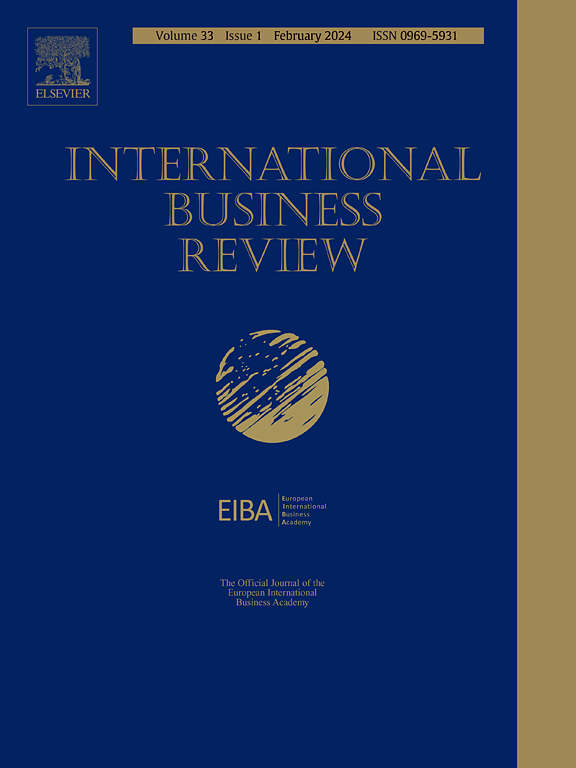The role of SME owner-managers’ leadership self-efficacy, cultural intelligence and emotional intelligence in foreign market entry mode
IF 6.1
1区 管理学
Q1 BUSINESS
引用次数: 0
Abstract
Small and medium-sized enterprises (SMEs) internationalize to pursue growth opportunities, diversify revenue sources, and enhance competitiveness. Choosing an appropriate foreign market entry mode (non-equity modes such as direct exports, or equity-based modes such as acquisitions) is crucial, as it affects resource allocation, control, and risk in new markets. However, existing literature on entry modes focuses on large firms, limiting the understanding of how SME owner-managers’ individual competencies influence these decisions. Drawing on upper echelons theory, this study examines how individual-level competencies shape SMEs’ foreign market entry mode choices. Specifically, it highlights how leadership self-efficacy (LSE) drives SME owner-managers toward equity-based entry modes, while cultural intelligence (CQ) and emotional intelligence (EQ) strengthen this relationship by equipping leaders to navigate cultural and emotional complexities in international markets. Data were collected from 399 SME owner-managers in Norway and Azerbaijan and analyzed using binary logistic regression. The results confirm that high LSE is positively associated with equity-based entry modes, with CQ and EQ amplifying this effect. This study contributes to the literature in three ways. First, it introduces LSE as a novel factor in SME foreign market entry. Second, it extends the understanding of CQ and EQ as critical amplifiers in SMEs’ entry mode decisions. Finally, by applying upper echelons theory to SMEs, the study addresses a gap in the literature, demonstrating how individual-level competencies uniquely shape SMEs’ strategic choices in foreign market entry.
中小企业经营者领导自我效能感、文化智力和情绪智力在国外市场进入模式中的作用
中小企业的国际化是为了寻求增长机会,使收入来源多样化,提高竞争力。选择适当的外国市场进入模式(非股权模式,如直接出口,或股权模式,如收购)是至关重要的,因为它影响到新市场的资源配置、控制和风险。然而,关于进入模式的现有文献侧重于大公司,限制了对中小企业所有者-经理个人能力如何影响这些决策的理解。本研究以上层梯队理论为基础,探讨个人胜任力对中小企业海外市场进入模式选择的影响。具体来说,它强调了领导自我效能(LSE)如何推动中小企业所有者-管理者走向基于股权的进入模式,而文化智力(CQ)和情商(EQ)通过装备领导者在国际市场中驾驭文化和情感复杂性来加强这种关系。本文从挪威和阿塞拜疆的399名中小企业业主经理中收集数据,并使用二元逻辑回归进行分析。结果证实,高LSE与基于股票的进入模式呈正相关,而CQ和EQ放大了这种影响。本研究对文献的贡献体现在三个方面。首先介绍了LSE作为中小企业进入国外市场的一个新因素。其次,它扩展了对CQ和EQ作为中小企业进入模式决策关键放大器的理解。最后,通过将上层梯队理论应用于中小企业,研究填补了文献中的空白,展示了个人层面的能力如何独特地塑造了中小企业进入国外市场的战略选择。
本文章由计算机程序翻译,如有差异,请以英文原文为准。
求助全文
约1分钟内获得全文
求助全文
来源期刊

International Business Review
BUSINESS-
CiteScore
14.10
自引率
6.90%
发文量
95
审稿时长
62 days
期刊介绍:
The International Business Review (IBR) stands as a premier international journal within the realm of international business and proudly serves as the official publication of the European International Business Academy (EIBA). This esteemed journal publishes original and insightful papers addressing the theory and practice of international business, encompassing a broad spectrum of topics such as firms' internationalization strategies, cross-border management of operations, and comparative studies of business environments across different countries. In essence, IBR is dedicated to disseminating research that informs the international operations of firms, whether they are SMEs or large MNEs, and guides the actions of policymakers in both home and host countries. The journal warmly welcomes conceptual papers, empirical studies, and review articles, fostering contributions from various disciplines including strategy, finance, management, marketing, economics, HRM, and organizational studies. IBR embraces methodological diversity, with equal openness to papers utilizing quantitative, qualitative, or mixed-method approaches.
 求助内容:
求助内容: 应助结果提醒方式:
应助结果提醒方式:


